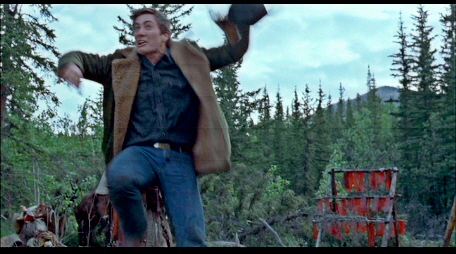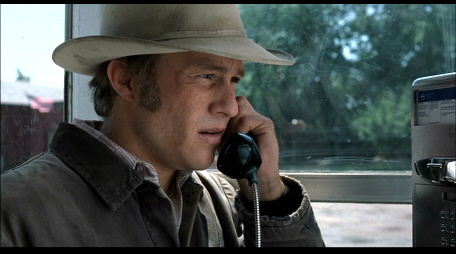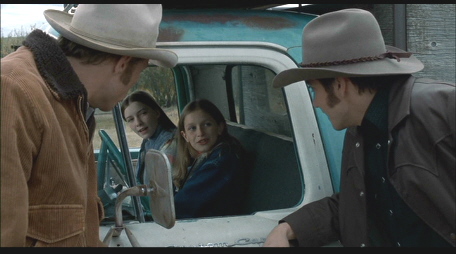RATED: R
RUNNING TIME: 134 Minutes
SPECIAL FEATURES:
• On Being a Cowboy
• Directing from the Heart: Ang Lee
• Interviews with writer/producers Larry McMurtry and Diana Ossana
• The Making of Brokeback Mountain
The Pitch
Two men fall in love in an intolerant rural mid-60s backdrop and struggle with their feelings for the rest of their lives.
The Humans
Heath Ledger, Jake Gyllenhaal, Randy Quaid, Anne Hathaway, Michelle Williams, Linda Cardellini
The Nutshell
Ennis Del Mar (Heath Ledger) and Jack Twist (Jake Gyllenhaal) spend their summer months in 1963 alone protecting a herd of sheep for the overbearing Joe Aguirre (Randy Quaid). Slowly, as they open up to one another they find that they have much in common and fall in love. Not knowing how to deal with this, they go their separate ways after their tenure as herders ends. Both men try to force themselves into a traditional lifestyle and put their efforts to marrying and having children. Though they are never far from one another’s thoughts. Five years later they begin stealing away hours to be together under the pretense of fishing trips. At first, this seems to be an acceptable compromise. As they continue to deny their needs they make themselves, and the people who love them, miserable.

"Screw Toby! Could his Spider-man do this?! Thwip-thwip-thwip!"
The Lowdown
The temptation with discussing Brokeback Mountain is to refer to it as simply a love story with two characters that happen to be gay. That description just doesn’t fit. Even comparing it to a Romeo and Juliet style story of starcrossed lovers fails to encompass the scope of the story told here. Although Ennis and Jack live in a world where their kind of love isn’t even brought up in polite conversation (a world we sadly still live in), this obstacle only touches the level of impediment with which they must deal. After the first drunken, fundamental physical expression of their needs both men feel a deep shame. They are products of their own ignorant and intolerant environment. Their first reaction to emotions so strong is to deny them. They both claim that they aren’t "queer". Even after fully giving into their own desires, Ennis prefaces their next encounter with "I’m sorry". This is why Brokeback has garnered such a negative reaction from a percentage of the population. These two men don’t fall into safe stereotypes. They’re not effeminate queens easily passed off as "those people". They’re complex personalities dealing with a situation they have no archetype to draw from. They don’t want to be gay. Moreover, they don’t know how.
Ang Lee’s finesse in storytelling is in top form here. Even Crouching Tiger, Hidden Dragon‘s intimate saga amidst an epic landscape is overshadowed by Brokeback. Not since David Lean has a director been able to bring this kind of sweeping landscape to life through a penetrating look at the human experience. In conjunction with Rodrigo Prieto’s brilliant cinematography, the images we see are bald and naked. We aren’t spoonfed information, but messages couldn’t be more plain. A scene where Aguirre appears at the basecamp to pass on that one of Jack’s family members is suffering from pneumonia has dialogue that superficially holds little information. Glances made by both characters and a deliberate peek through binoculars made by Aguirre makes a whole subtextual conversation between the two become clear. Later in the film when Ennis has placed all his efforts into living a life considered normal, there is a scene during a Fourth of July fireworks display. A couple of bikers sit near Ennis and his family and discuss the local women in the most repulsive way possible. Ennis confronts them and violently puts them in their place. A static image is shown of Ennis from a low angle. He is posed, masculinity shown with a literal fanfare of rockets’ red glare behind him. He is larger than life and he is everything that America stands for. Ironically, this hateful display in an effort to defend his family from little more than a perceived threat is more socially acceptable than a display of Ennis’ expression of love for Jack would be. This representation of brute force as an admissible reaction was touched on in Cronenberg’s A History of Violence from the same year, but never so eloquently as this one scene. Nor did A History of Violence have that extra dimension of the wrong kind of love being less tolerable than hate.

"Julia! Hi! What’s going on? We haven’t talked since… yeah, since Ten Things.
So how’s it… what? A booty ca… No… What? No!
Okay. Yeah."
The performances in Brokeback are across the board impressive. Jake Gyllenhaal as the character more accepting of his homosexuality pours anxiety onto the screen. Randy Quaid’s Aquirre is a character that could easily be played melodramatically with a twist of a mustache. Instead, he is a man who excuses his own prejudices under the guise of looking out for his business. The women, Anne Hathaway, Michelle Williams and Linda Cardellini each represent a different reaction to an unfortunate position in which they can never truly be involved. Confusion, anger and yearning each in turn are given their full exploration. However, even amongst this high level of thespianism on display, Heath Ledger stands out. His Ennis Del Mar is one of the most real performances in recent memory. Carrying the majority of the screen time, Ledger keeps us captivated with his withdrawn, introverted depiction. With a small look or gesture, Ledger conveys a man feeling so much yet unable to express. A lesser actor couldn’t make such a character unable to emote as interesting.
Brokeback Mountain is a film that can be appreciated by anyone. The feelings of yearning and helplessness are quite universal. It is a film representing a director, cinematographer and cast at the top of their game. The score by Gustavo Santaolalla utilizes a lone acoustic guitar slowly joined by a violin and a steel guitar, perfectly complements the themes shown. Everything in this film nears perfection. History will eventually prove this as one of the greatest English language films. Not as a gay film or as a love story or as a cowboy flick, but as a piece of cinema encompassing all those things and accomplishing much more.

"It’s a four hour drive, sure. But Dave promised us four kinds of candy."
The Package
Disappointing. On Being a Cowboy is under six minutes of the stunt coordinator talking about how much of the stunts were performed by the actors. Directing from the Heart: Ang Lee is less than seven and a half minutes of interviews with Lee and producers talking about Lee. The interviews with Larry McMurtry and Diana Ossana are less than eleven minutes and they go a little deeper on what they had to do to get the E. Annie Proulx short story to the big screen. The Making Of featurette is under twenty-one minutes long. Its run time is about half scenes from the film and half interviews with some soundbites repeated. It’s only twenty-one minutes, yet they found the time to run some quotes more than once. The narration by Rachel Perry completes the superficial made-for-Entertainment Tonight feel of the thing. No extra in the history of DVD extras has such a wide gap between a quality film and a useless Making Of. All told, the extras on this disk amount to less than forty-five minutes. For shame.
The cover is a small clipping of a variation on the poster art framed by silver demanding that you take notice to the three Academy Awards this movie garnered. Hopefully Criterion will get their hands on this property some day and give us a decent presentation. As is, this is still a must-own DVD. Just make sure you pawn it off on eBay the instant you get wind of the inevitable double dip.

"So I says to those bloodsucking shysters, I says, ‘Hell no I don’t want any
freakin’ back end! Give me my SAG minimum up front before this thing tanks!’
Nobody takes advantage of Randy ‘Brainiac’ Quaid!"
9.5 out of 10
